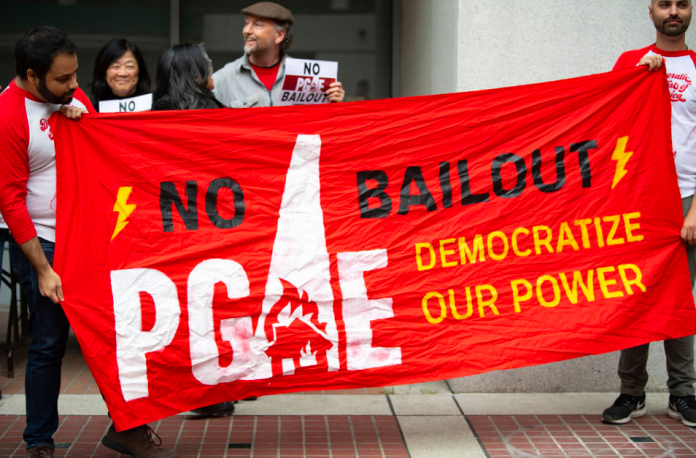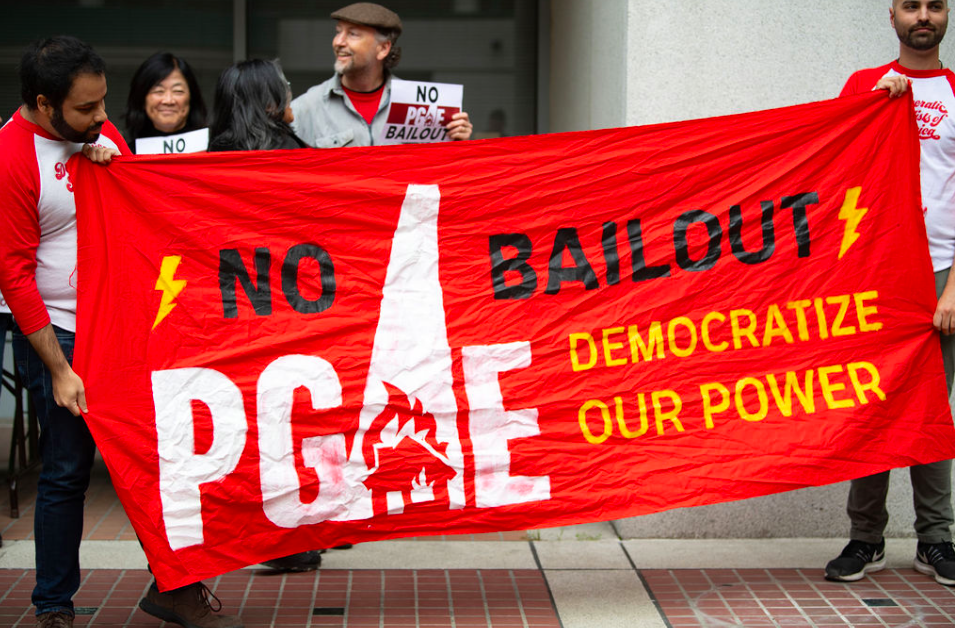
The collapse of Pacific Gas and Electric Company is leading to serious efforts on both the statewide and the local level to replace the failed private utility with public-power agencies.
The grassroots movement is in place. The political and financial information is clear.

A group of Democratic Party activists, led by party delegates Glenn Glazer and Lowell Young, working through the Coalition for a Power Safe California, is circulating a petition asking the party at its May convention to approve a resolution calling for statewide public power. The current draft, which is still a work in progress, says the following:
Whereas the public good must always be the first consideration of the people and our government, and it is demonstrable that PG&E has been acting in wanton and probable illegal disregard of the public’s health and well-being by differing maintenance and upkeep of their equipment as demonstrated by the roughly 40 fires and gas explosions known to have been caused by their unmaintained equipment, including the San Bruno gas explosion, for which it is on probation for causing, and because of its poor safety record, the PUC is considering the possibility of breaking up PG&E as well as other measures against it; and
Whereas PG&E faces financial ruin due to law suits that have resulted from their negligence and poor management and faces bankruptcy, which will disrupt the company’s operations and place the public’s well-being in great jeopardy, and PG&E has asked for rate increases to cover their losses rather than letting their stockholders bear those loses which is a risk of holding stock in any corporation; and
Whereas the State has shown that it can run an insurance company that competes on the open market successfully, and that operation, The State Fund, and the FAIR programs can be used as models on how to run a non-profit public utility owned by the people by keeping the existing employees of PG&E and installing a top management team initially appointed by the governor and the leaders of the state Senate and the Assembly;
Therefore we call upon the California State Government to acquire PG&E by Eminent Domain or to purchase the stock of PG&E at the lowest market value of the stock in the three years prior to the stocks purchase to prevent the manipulation of the stock’s price which would be unfair to the public, and any loss should be borne by the shareholders of recorded on the date of takeover, and 50% of the new board of directors shall be employees and union representatives and all current union benefits shall be honored and each union shall have their membership protected and all other PG&E employees would be encouraged to unionize. Said new management shall run the company for the benefit of the people and serve until replaced by the State Legislature and governor.
The state party controls resolutions pretty tightly, and I have seen party chairs deflect and quietly kill anything that might offend potential donors (and in the past, PG&E has donated to lots of Democratic Party officials, including the current governor, Gavin Newsom). But there’s momentum here, and this resolution will be hard to ignore — particularly with the growing number of progressives winning election as state party delegates.
I wonder if someone at the San Francisco Democratic County Central Committee will introduced a resolution supporting this concept; it would draw some clear lines on that panel.
Meanwhile, Sup. Aaron Peskin has told me that acquiring PG&E’s distribution system – or at least starting that process – is a top legislative priority for 2019.
And on Thursday/14,the Board of Supes Rules Committee will hold a hearing on PG&E’s intransigence in providing connections to let the city use its own hydropower to power public agencies and affordable housing projects. That’s been an issue for more than a year, and Sup. Hillary Ronen is asking for an update.
Peskin’s suggestion, which will likely come up at the hearing, is that the city buy its own distribution system, so that PG&E can’t control the local power grid anymore.
Help us save local journalism!
Every tax-deductible donation helps us grow to cover the issues that mean the most to our community. Become a 48 Hills Hero and support the only daily progressive news source in the Bay Area.
The hearing starts at 10am, City Hall Room 263.
That committee will also hear an ordinance rescinding the authorization for the San Francisco Police Department to be a member of the National Rifle Association or collect NRA tournament fees. Sup. Catherine Stefani wants the city to sever all ties with an organization that opposes even the most modest restrictions on the ownership of assault weapons.
On Aug. 30, 2018, a student at Balboa High accidentally discharged a gun, setting off a massive law-enforcement response. In the process, three students were detained and questioned by the cops, and one student was (wrongly) identified in some news media as the shooter.
Now Sups. Ronen, Peskin, and Vallie Brown are introducing legislation to require than anyone 17 or younger who is questioned by police to be provided with a lawyer and to have parents present. The law would ban the cops from asking any questions of any minor until that person has legal (and parental) representation.
Current state and federal law say that cops can’t question anyone 15 or younger without a parent or lawyer present. But according to a Dec. 20 letter sent to Ronen from the National Center for Youth Law:
Law, science, and common experience all conclude that, as compared to adults, youth have less capacity to understand their rights and are significantly more vulnerable to giving false statements in response to routine interrogation. …
Currently, youth 16 and older in California can waive their Miranda rights on their own, as long as the waiver was made in a voluntary, knowing, and intelligent manner. However, research demonstrates that young people often fail to comprehend the meaning of Mirandarights. Even more troubling is the fact that young people are unlikely to appreciate the consequences of giving up those rights. They are also more likely than adults to waive their rights and confess to crimes they did not commit.
The Rules Committee will consider the legislation Monday/11 at 10am, Room 263 City Hall.
Sup. Sandra Lee Fewer has a far-reaching proposal: She wants qualified non-profit housing organizations to have a right of first refusal on any multi-family housing that goes on sale in the city.
That would mean anyone who owns a building with multiple tenants would have to inform the nonprofit housing community that they want to sell the property, give that nonprofit the first right to bid on it – and also give the nonprofit the right to match any private bid that the landlord is prepared to accept.
The legislation would guarantee that any tenant in any building purchased by a nonprofit would get to remain at the same rent and under the same lease conditions.
The law would be a boost to the existing “small-sites” program, which sets aside money (not enough) to help prevent evictions by helping nonprofits and land-trust operations buy at-risk buildings and take the out of the private market forever.
The Planning Commission will discuss Fewer’s proposal Thursday/14. The hearing starts at 1pm, City Hall Room 400.
